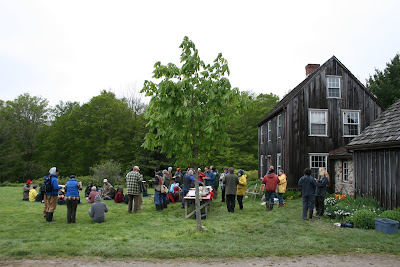My interest in learning more about organic agriculture led me to doing an internship through the C.R.A.F.T. (Collaborative Regional Alliance for Farmer Training) network of organic farms in Ontario. I lived and worked on two very different farms from May through to November 2010.
If you have an interest in learning more about organic farming I strongly recommend this experience of becoming an intern. Working and living the farm life alongside like-minded folks is a rewarding experience in many ways. Many skills can be learned and honed doing a CRAFT internship. Not all farms are the same, so contact them and ask plenty of questions about what it's like to work there and what you can expect to learn. The organizational structure and goals of each farm, what they have (animals and structures e.g. greenhouses), what they grow, practices used, working conditions and hours expected to work, living arrangements, stipend, and educational component offered will be different on each farm.
 Here are the interns from many different farms at our first CRAFT day. Held once monthly, interns from all farms have an opportunity to tour another CRAFT farm, learn about a specific farming related topic through guest speakers or presentations, have a fabulous potluck lunch and pitch in a little work for that farm. With so many hands a lot can be done in little time!
Here are the interns from many different farms at our first CRAFT day. Held once monthly, interns from all farms have an opportunity to tour another CRAFT farm, learn about a specific farming related topic through guest speakers or presentations, have a fabulous potluck lunch and pitch in a little work for that farm. With so many hands a lot can be done in little time!Many of the farms in the C.R.A.F.T. network have CSA (Community Supported/Shared Agriculture) programs. Plan B Organic Farms, a family run farm, is one of the largest CSAs in Canada. Working there gave me insights into the operation of a very large organic farm/CSA operation. Their model is different from some farms, in that they work with many other local organic farms and distributors in order to include a wide array of vegetables and fruits to their share members, not all always grown on their farm. Share boxes were delivered to urban centres (mainly Toronto and Burlington), either to individual houses or at depots (for example one house in a neighborhood of many who purchased shares would receive them all on their porch for that area.)

Fields at this farm were large and required a lot of focused work in planting, weeding, and harvesting. Produce was also sold at a few farmers' markets in Toronto. Running these farmers' market stalls were some of my favourite experiences as talking with people and seeing their joy in the produce we grew fueled my passion for the work I was doing. I learned a lot from direct experience on this farm and asking questions of the more experienced people around me, of which there were many.
A different model is used at Ignatius Organic Farm for their CSA and intern program. Members come to the farm and pick up their shares themselves in the farm store. The farm does not do any farmers' markets. This farm is very education focused and makes a concerted effort to know what the learning objectives of interns are and how they can be achieved. It runs a structured intern program where regular field trips and work shops are organized for interns as well. A huge variety of crops are grown on this farm's acreage and I really enjoyed learning how to grow and harvest such a wide variety of vegetables.
On both CRAFT farms I interned at I found a communal approach to working, living, and learning was essential; sharing knowledge, sharing ideas, sharing food, sharing the work load. The people I met during my time this growing season are likely the most valuable thing I have taken away from the experience; truly kind and loving people with a passion for growing healthy food and creating sustainable food systems in our communities.


No comments:
Post a Comment